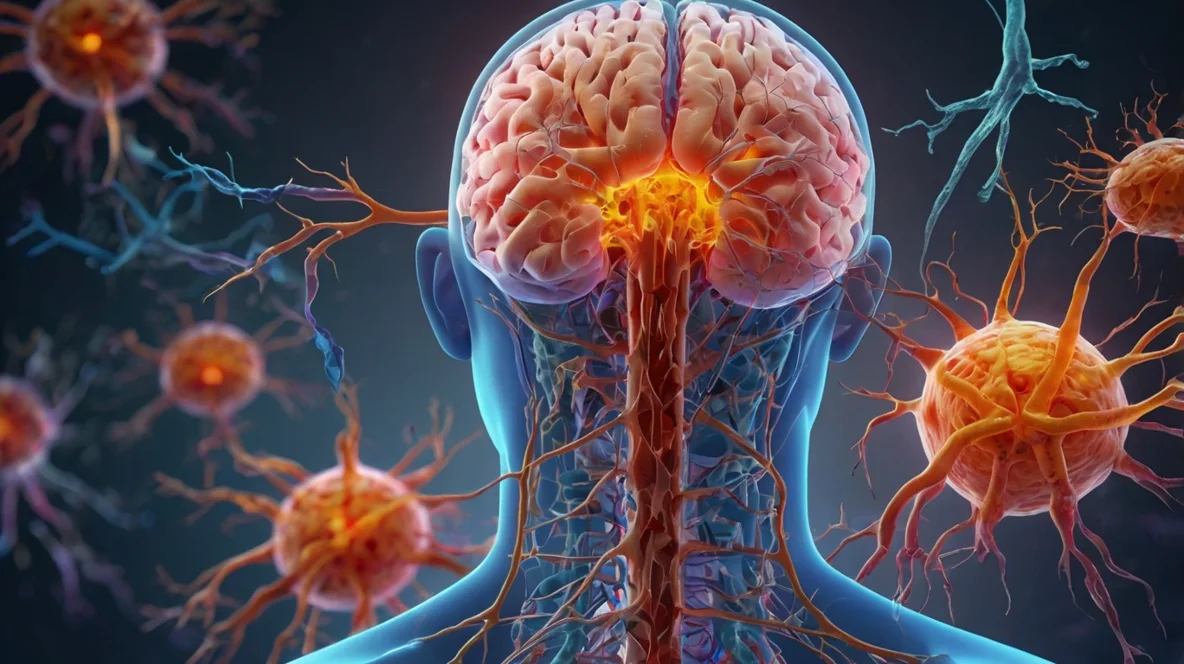Keywords: causes of multiple sclerosis, MS risk factors, genetics and MS, what environmental factors cause MS, MS causes and symptoms
Before we dig too deeply into the causes of multiple sclerosis, I should introduce myself. My name is Stephen Walker, living in Scotland with a wife and MS, I have an engineering background but am now retired as an OAP, a pensioner.
I was diagnosed with MS in 1994, although I now believe that I was born with multiple sclerosis in 1958.
Multiple sclerosis is a debilitating autoimmune disease that is characterised by a plethora of neurological symptoms:
- Vision impairment
- Brain fog
- Chronic pain
- Balance issues
- Cognitive deficits
This is not an exhaustive list of symptoms. I would be here all day if I tried to list them all.
The cause of multiple sclerosis is, as yet, unknown but a number of MS risk factors have been identified.
This blog post explores the causes of multiple sclerosis, MS risk factors, and the intricate relationship of genetics, environmental factors, and immune system behaviour.
Table of Contents
ToggleWhat is Multiple Sclerosis?
Multiple sclerosis is a complex autoimmune disease although, even this, is a moot point. The body’s immune system, erroneously, attacks the myelin sheath that protects the nerves in the central nervous system (CNS). This disrupts the normal signalling between the brain and the body. Resulting in disability, chronic pain and cognitive impairment.
Even though MS impacts the memory, I still recall the days leading up to my diagnosis. I was working in Aberdeen, experiencing constant tingling in my hands and face.
It was early evening and I was still in the office. I had decided it was time to call it a night and head home to my freezing digs in the Aberdeenshire countryside. I reached to pick up my briefcase and found that I couldn’t lift it. My hand wouldn’t remain closed to lift the briefcase.
It was this event that forced my hand into seeking medical advice. It turned out to be a revelation. When you look at the current overstretched NHS and the 08:00 am scramble to try and get an appointment.The NHS in 1994 was a comparatively well-oiled machine.
As I have stated, I was working in Aberdeen, I was not registered with a local GP but that wasn’t a problem. I managed to secure a GP appointment one morning, I was referred to the Aberdeen Royal Infirmary and I was seen the same day.
I was given a lumbar puncture, a blood test and an MRI scan all on my initial visit. In the present NHS climate, this might have taken a year to receive each of these treatments.
Exploring the Causes of Multiple Sclerosis
The precise causes of multiple sclerosis are still unidentified. It is widely accepted that a number of triggers can elicit that first attack.
However, scientific evidence points to a combination of genetic predispositions, environmental triggers, and immune system dysfunction as potential contributors.
Let’s look a little closer at these possible triggering factors:
Genetic Factors and MS
The Role of Genetics in Multiple Sclerosis
Genetics and MS form a close relationship. Although it has been proven that MS is not hereditary, a family history of MS is still a significant risk factor.
People who have a familial connection with MS are deemed to be far more susceptible.
Genetics are also a consideration. For example, variations in the HLA-DRB1 gene are linked to MS susceptibility. My mother was diagnosed with MS in her early thirties, which chimes with my own diagnosis.
Furthermore, the onset of multiple sclerosis is also thought to be triggered by childhood infections. Again, I can relate to this. Prior to my initial exacerbation, I had been working with my father, helping him build a new house.. I was staying in a cold, draughty caravan and I succumbed to a bad bout of influenza.
I was very ill for several days and my MS kicked in a few months later. This may have only been a coincidence but I am still suspicious.
What Environmental Factors Cause MS?
The Impact of Environmental Triggers
Environmental factors have long been suspected of being relevant to the development of MS:
- Vitamin D Deficiency: The prevalence of multiple sclerosis is higher in cooler climates. Areas of the planet with shorter daylight hours have a higher incidence of MS. This is because vitamin D plays a crucial role in immune function and vitamin D is produced in the skin when it is exposed to sunlight.
- Infections: viral infections, particularly Epstein-Barr virus (EBV), have been associated with MS. It is believed that these infections can trigger an autoimmune response in susceptible individuals.
- Smoking: smoking is a health risk in all people. However, as an MS risk factor it is very significant. Smoking doubles the likelihood of developing MS. It is also known to exacerbate symptoms in people who have already been diagnosed with the condition.
- Obesity: A high body mass index (BMI) during adolescence has been linked to an elevated MS risk level. This was not a factor in my case. As a young man, in my pre-MS days, I was active, fit and slim. This increased risk might be related to the inflammatory effects of adipose tissue.
The Immune System and Multiple Sclerosis
MS is considered, by many, to be an autoimmune disorder. The immune system mistakenly identifies myelin as being a foreign substance, launching an attack that causes inflammation and nerve damage.
The precise trigger is unknown but lifestyle factors and environmental toxins are suspected of being responsible.
The immune system is, generally, our friend and protector but when MS is involved, it can be our sworn enemy. The immune system, when it works, can kill alien viruses and bad bacteria but with autoimmune disease it is trying to kill us.
Types of Multiple Sclerosis
Understanding the types of multiple sclerosis can offer insights into the disease’s progression and severity. The four main types include:
- Clinically Isolated Syndrome (CIS): The first episode of neurological symptoms caused by inflammation. This explains why, after my visit to the Aberdeen Royal Infirmary, I was not diagnosed with MS.
- Relapsing-Remitting MS (RRMS): Characterised by episodes of new or worsening symptoms followed by periods of remission. A stage I went through for about 10 years which I believe is normal.
- Secondary Progressive MS (SPMS): Apparently, after about 10 years RRMS will progress to the SPMS stage. Which, in my case, was the way my MS developed.
- Primary Progressive MS (PPMS): Steady worsening of symptoms without relapses or remissions.
Each type of MS varies in severity and progression, underlining the need for personalised treatment approaches.
MS Causes and Symptoms
MS symptoms can vary a great deal depending on the extent of nerve damage and the specific nerves affected. This can be attributed to the location of lesions. I have scarring or sclerosis in my brain, visible on my MRI scan. A good friend of mine has SPMS and his lesions are in his spine, which explains his impaired mobility and his lack of brain fog.
Common symptoms include:
- Fatigue
- Vision problems
- Muscle weakness or spasms
- Difficulty with coordination and balance issues
- Cognitive impairment
- Numbness or tingling sensations
Understanding sclerosis what are the symptoms helps individuals recognise early warning signs and seek medical intervention promptly.
Key MS Risk Factors
A number of factors can increase an individual’s likelihood of developing MS. These include:
- Age: MS commonly affects individuals between 20 and 40 years of age.
- Gender: Women are more than twice as likely as men to develop MS, suggesting hormonal influences.
- Ethnicity: People of Northern European descent are at higher risk, while those of Asian, African, or Native American descent have lower prevalence.
- Family History: A family history of MS can increase risk, as previously discussed under genetics and MS.
Recognising these MS risk factors can aid in early detection and allow a proactive management approach.
The Role of Lifestyle in Managing MS Risk
While certain risk factors are beyond our control, adopting a healthy lifestyle can help mitigate some environmental influences. Key strategies include:
- Maintaining a balanced diet rich in anti-inflammatory foods.My preference is the Wahls Protocol’
- Engaging in regular physical activity. When you are fatigued, the last thing you want to do is exercise. But, gentle, even sedentary exercise will improve your energy levels and feeling of well-being.
- Avoiding smoking and excessive alcohol consumption. Ironically, I asked my neurologist about smoking and he told me: “I can give you a hundred reasons to stop smoking but, MS is not one of them.” I think he was wrong and that this was very bad advice.
- Ensuring adequate vitamin D levels through safe sun exposure or supplementation. This probably explains my desire to move to Spain.
Insights from the National Multiple Sclerosis Society
The National Multiple Sclerosis Society is a charity focussed on improving the lives of people living with MS. They emphasise the importance of ongoing research to uncover the precise causes of MS. Their initiatives aim to improve learning in the MS community so that people with MS can find ways to mitigate the worst effects of this disabling disease.
Frequently Asked Questions
At present, there is no consensus on the cause of MS. The current thinking is that a combination genetic predispositions and environmental triggers are the most m likely contenders. The immune system’s role in mistakenly attacking myelin is one of the most perplexing questions that need to be answered.
Yes, MS, except in very rare cases, is not life-limiting. Improvement in treatments and symptom management have seen great strides in life-expectancy and quality of life.
At the time of writing, I am 66 years old and my mother is 88. We have both been contending with multiple sclerosis since our thirties.
There is no one, definitive, leading cause of MS. It is thought that a family history of MS, childhood infections and exposure to environmental pollution are all factors that can, cumulatively, predispose one to developing MS.
Other factors, like vitamin D deficiency can also play a part.
In summary, the following scenarios can increase the risk of developing MS:
your immune system
your genetics (having a family history of MS)
your environment (especially the environment you grew up in) air-borne toxins, household cleaners, traffic fumes.
previous infections (such as Epstein-Barr or human herpes virus)
These are all factors of modern living which may explain why the instances of MS appear to be on the rise.
Conclusion
When you have been diagnosed with multiple sclerosis it’s natural to think that it is the result of something you have done. Perhaps a poor lifestyle of smoking and drinking or poor food choices.
On a positive note, do not feel guilty. You have not caused MS. MS is caused by a combination of factors which you probably had no control of.
It was not bad living, it was bad luck!
We are humans and humans are very adept at adapting. Yes MS will change your life but it will not end your life, it will not ruin your life, it will only change your life.
Accept the new you, you are strong, you are an MS warrior. Go forth and thrive.
Thank you for reading my ramblings about the causes of multiple sclerosis. I am an MSer and I am happy!




